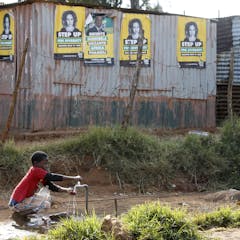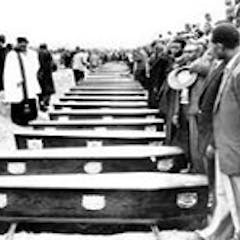
Artículos sobre HIV
Mostrando 221 - 240 de 375 artículos

The AIDS crisis arrived in Australia in 1982 and triggered an enormous (and successful) public health response, largely driven by volunteers. These people, often from marginalised communities in their own right, deserve recognition in Australia’s proud volunteer tradition.

The introduction of Pre Exposure Prophylaxis drugs in Kenya aims at reducing new HIV infections among people facing substantial ongoing risk.

HIV remains a synonym for death in Kinshasa and many leave testing and treatment until it’s too late. It’s not common knowledge that an infected person can live a normal and healthy life.

Massive online DNA databases can be used as a resource to discover viruses – even if the data had not been explicitly collected for that purpose.

Full decriminalisation of sex work is advocated by many health and human rights organisations around the world. Sex workers in New South Wales kick-started the process 40 years ago.

Australia has been subsidising drugs to cure hepatitis C since March 2016. Unlike in many other countries, these are available to everyone with the disease and are much cheaper for our government.

Why is it only some viruses are transmissible by blood, and how does the virus actually move from person to person?

Despite being so small they can’t be seen with the naked eye, pathogens that cause human disease have greatly affected the way humans live for centuries.

Here we explore our past and present struggles with the most significant infectious diseases human beings have faced.

Marriage has long been tied to better health. The first study of the relationship between marriage, health and quality of life for LGBT Americans affirms the benefits of marriage – with some caveats.

The number of new HIV-positive cases has sharply declined – in most parts of the country. Nonurban areas, particularly in the South, are showing sharp increases. Why?

Under pressure to create new markets, big alcohol producers are scouring the African continent in what promises to yield negative socioeconomic consequences.

Africa is expected to have among the steepest increases in the number of people affected by non-communicable diseases - it needs health care systems that can cope.

An independent expert provides his pick of the most notable drugs added to the PBS on May 1, 2017.

Contraception saves lives, and U.S. spending on it abroad had an unintended upside when it formed the backbone of early HIV prevention efforts.

Double standards about sexual activity not only make life difficult, but they also complicate STD research. As we observe STD Awareness Month, it’s good to think about how to get to the truth.

Cultural portrayals of HIV and AIDS tend to be stuck in the past.

As South Africa marks Human Rights Day and the 20th anniversary of its constitution it’s a good time to reflect on the problems it faces in making constitutional rights a reality.

Besides a reminder of a dark period in South Africa’s history, Human Rights Day also celebrates the country’s unique, highly acclaimed constitution which guarantees human dignity and equal rights.

We have an awful lot in common with the viruses that infect us.
